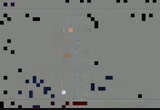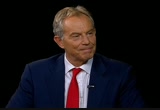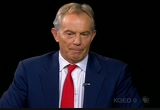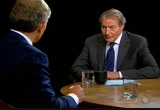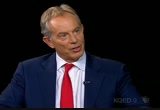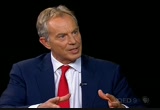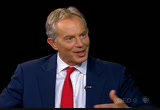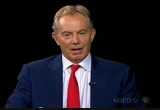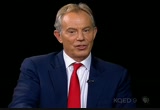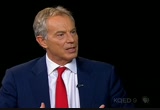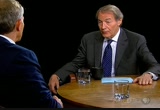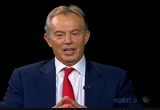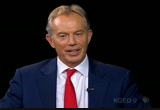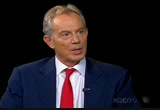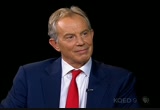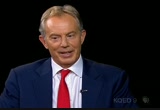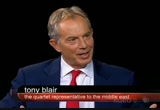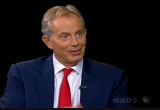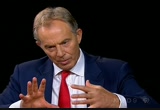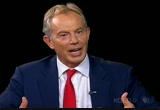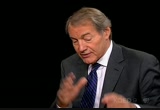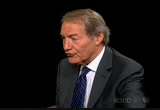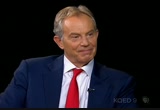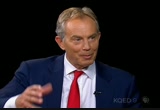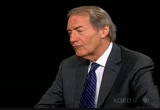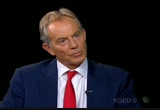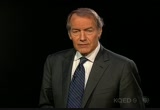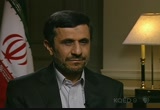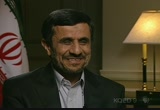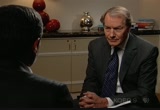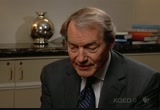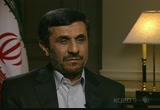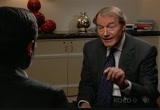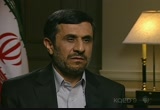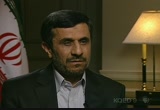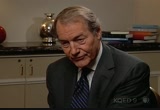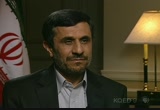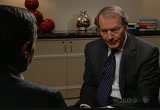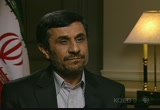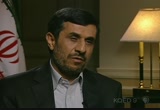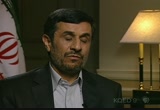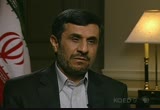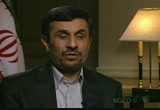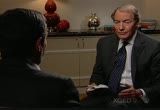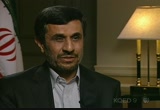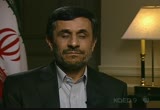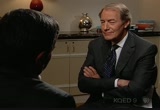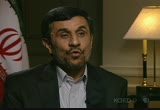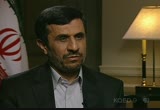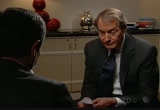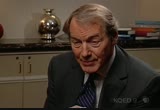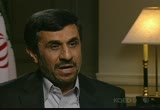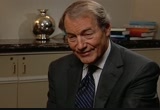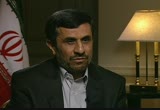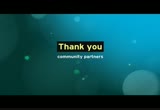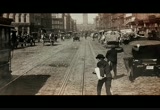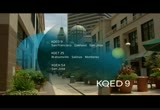tv Charlie Rose PBS September 21, 2011 12:00am-1:00am PDT
12:00 am
is going to be through negotiation. >> charlie: we continue this evening with part one of two-part conversation with mahmoud ahmadinejad, the president of iran. >> we're not afraid of anyone in declaring our pitions. we have great relations with syria. bo wh the people of syria anwith theovernment of syria. and now we are working hard in order to create a dialogue between the oppition and the government in order to provide the framework for them to reach an agreement. and we believe that this is the only way, the right way. >> charlie: tony blair and part one with our conversation with the president of iran ne. funding for charlie rose was provided by the following:
12:01 am
>> eve story needs a hero we can all root for, who beats the odds and comes out on top. this isn't just a hollywood story line, it's happening every day all across america. every time a storefront opens or the midnight oil is burned or when someone chases a dream, not st a dollar. they are small business owners. so if you want to root for a real hero, support small business, shop small. additional funding provided by these funders: captioning sponsed by rose communications from our studios in new york city, this icharlie rose.
12:02 am
>> charlie: tony player is here he served as prime minister of great britain f ten years stepping down in 2007, he has been the middle east envoy which includes the united nations, united states and russia. he has been involved in last minute efforts to restart direct peace talks between israel and palestine. the palestinians said they will apply to the united nations security camp for statehood this friday. i'm please to do have tony blair back at this table especially this moment when hs involved in the most important negotiations that are taking place at the united nations. welcome. >> thank you, charlie. >> charlie: where are we? what formula are you looking for from all parties? >> the formula we're looking for is one that gives a framewo for the negotiation so that people think it's credible. so for example you start from the idea that the palestinian state will be based on the
12:03 am
borders in 1967 but they will be mutually agreed slots which means you have variations on that borders that will be different from 67 but it's all part of the negotiation which starts from the 67 lines. then you deal with border and security first, right so you don't just deal with security, you also deal with borders. you get these two very difficult issue out of the way and you have jerusalems and refugee and a time frame with a sense of urgency and direct them in way to come up with proposals that are comprehensive for peace. so the idea, very simply, i'm not saying we'veot this idea yet in place but the idea is to put that framework reference in the negotiation so the people know it's credle and they're not just sitting around the table talking, they're actually going to be doing somethin >> charlie: the parties might
12:04 am
say we've been trying this with no success for a long long time. how can you expect just to come to an agreement now? >> my point there is always two-fold, actually. e first is by the way the fact that you've not succeeded in the last 20 years doesn't mean to say you'll never succeed. and more than that we had 30 or 40 years of failure before we had success. but actually the most important thing in relation to this issue is to say it's not quite true that we never got anywhere. actually we came quite close to thyear 2000 with president clinton. actually we came quite clo with prime minister -- >> charlie: in one case one walked out and in another case abbas did not. >> slfs slight argument because prime minister ulmut was not carrying this through. when people say we've gotten no
12:05 am
where, i think the issues are so well gone over, so well defined, if you took five israelis and five palestinians and put them in a room together the resolution wouldn't come out that much different. >> charlie: everybody knows essentially where the end game is. >> i think they do and that's quite different from northern ireld where we had this discussion with the fundamental disagreement about the end game. in this case, everybody agrees. we want two states, secure state of israel, and the viable state of palestinian. >> charlie: the palestians make this argument and turk rki al faisalade this statement, if you're going to negotiate with the israelis over rusalem andhese issues. >> i think what most people
12:06 am
think is in the end, they are fully entitled to take it to the united nations and say we want recognition. the only way you'rgoing to get a state is if you negotiate its borders, israelis and palestinians together. so the concept of the state, if you like where you got two parts gaza and the west bank and the different authorities by the way where we haven't yet agreed the border of the states, it's obviously preferrable to have the negotiation and then declare the state. >> charlie: and the arguments he makes. >> correct. i sympathize what they're saying on that. on the other hand i say to them at the moment we've got no negotiations and settlement construction. and the best way to resolve the issue of settments is to research the issue of borders.
12:07 am
so provided you've got a time line is a very tough time line for this negotiation in which the parties very soon will make substantial progress in the negotiations. what that menial i you get the framework to resolve the issue of boards, and onceyou resolve the issue of borders then you resolve settlement. i think palestinians are entitled to say we want to be recognized as a state. now that doesn't happen over night by the way. that will take some time. i think what is difficult is that people say we want, we demand recognition of the state but we're not prepared to have this negotiation on terms that are fair. obviously those terms have got to be fair. i've said all the way through if they come to the united nations this week, the question is can we combine whatever happens in the u.n. with the relaunched negotiation. if we can then i think we're in the business of advancing this
12:08 am
then. if we can't from the israeli perspective, they've got a view on this and say you've chosen to go through the un rather than negotiations and then you have the parting of the ways. >> charlie: but then you have them trying to understand which is what do you combine? you combine their esence at the u.n. with negotiations. how does that work? >> it works in a number of differenways because this is really for the palestinians so let me be a little bit company about how this all works out they made it clear they're going to launch for membership. >> charlie: at the general council and not at the general assembly. >> that's what they said. they've got the option of dpoarg -- going to the general assembly. whatever happens at the u.n. let's take that one step if you like, what is important is to launch a negotiation so tha we have aituation where the palestinians and israelis are trying to resolve these issues and the onl way you will resolve them on the ground.
12:09 am
and the anxiety of people, i've justome back from my 71st visit there. i'm there the wle time. it's on the ground you need change. and if you don't get the change on the ground, then you can pass any number of resolutions but you wouldn't get peace. so i'm not, as i say, i'm the reason why the palestinian are here at the u.n. i understand they're going to launch this application for membership. so whatever happens here in new york, the only way of producing change in palestineis going to be throug negiation. >> charlie: palestinians will say look we have been doing thing on the ground. so we are changing on the ground now and should give us some credit for that, you know and engage in negotiations with us. are the israelis saying we will notegotiate if the palestinians go ahead with the statehood request? >> i think what the israelis are
12:10 am
saying this needs to be resolved by negotiation. it's not for me to say what ty might do. i think it depends in a w not just what happens at the u.n. but the atmosphere around how happens. what you say about state building is absolutely right. this is a really important point. the truth is in the last few years as a result of what prime minister has done under the president's leadership has been to create institutions of statehood a are now recognized by the imf and the world bank and the others as those are the fully functioning state. now we've still got to cause the split between gaza and the west bank. it's a problem for the palestinians, the israelis as well and the community. certainly on the west bank, there have been, if anything has worked in the last few years, it's been that state building program. as a result of that by the way, to just give you a specific example. because of the improved security, the palestinians have
12:11 am
put in on the west ban in a place like in the north part of the palestinian territory, we've got the israelis to open up the border. there are now arab israelis or israeli arabs who come over the border. they will do their shopping and business and commerce. the result o that has been literally millions of dollars flowing intot economy. so over the st two or three years the palestinian economy on the west bank is in double figures. >> charlie: what do you make of the idea that some say if the united states is forced to veto in this security camp, there will be terrible repurpose ssions for the united states role in the middle east and the government -- gulf and other parts of that wod. >> it's very difficult. this is why it's important we're stving to relaunch the negotiation. i don't think what y will get this week is simply a u.s. veto. i hope it doesn't come anyway by the way but i think everyone is
12:12 am
focused also in making it clear that there is a basis for new negotiations. and by the way i believe very strongly this is a basis for a new negotiation. >> charlie: what do the israelis want? i think it's very clear what they want. they want to know that any palestinian state will be properly run and they will be secure as a result. it mighte for the israelis, this is actually very simple. you see, in the region that we have at the moment where there's this massive instability, in a funny way for the israelis, even though at one level they support democracy and the changes in egypt and even syria and so on. on the other hand, all their fix the points of stawability -- there's no guarantee the new egyptianovernment will have the same as mubarak had to them. >> there will be a far more poweul feeling on the street which is one of the things that
12:13 am
makes it important to get this negotiation going. r the israelis i think it's really quite simple. what they want to know is the pal to be state that will come into being is going to be securely and properly governed so they can live in peace and the palestians can live in peace. >> charlie: sohen what can be done in negotiaons to assure them of that? >> i think actually, and obviously a whole lot of instrumental things about security presence and so on. but the absolutely central thing is not something that as it were put down on a piece of paper. it is they feel psychologically and politically and really in profound way socially, the palestinian people have said that's it, that's the end of the claims. this is the negotiation, this is the fine negotiation, we've sorted it out. we've got our state, they've got their state. their state's for their people, our state's for our people. enough, let's get on with our lives.
12:14 am
now i think positively the israeli perience ingaza, that's very tough for them. there are all these counterexplannations but for the israelis it's important for them to understand this. look we took settlers out of gaza, 7,000 of them and what we got was hamas take over with rockets. so you wanus to do this on the west bank. i understand that, which is why this thing has got to be handled -- >> charlie: i understand that too. wh do you say to them. >> what i say is this -- >> charlie: there's a on the ground stability if it takes place in the statehood and -- it will grow and spread throughout the west bank. >> i think what we have shown in thwest bank is what works. the few years back, you can say well it's not quite clear what works. now it's absolutely clear. what's clear is the palestinians taking their obligations and with help from the americans, europeans, jordannians and others, and it then requires for
12:15 am
the palestinian politics as a whole because nobody gets a deal to say gaza and west bank is one state under one authority and one rule of law. now that is something in the end the palestinians have toert sort out. >> charlie: are they doing that. is there any evidence, because turki al faisal said in a sense hamas is protecting israel he said from desperate groups who want to, in fac they are doing some posive things, that is the point he raised, you're looking increduloust that idea. >> look -- >> charlie: any privacy on mas is my point. >> i don't know. >>harlie: it would be crucial. >> it would be crucial for one of two things to happen. either hamas change and become part o the solution or alternatively the palestinian people make it clearhat they want people who are gng to promote peace and not cflict.
12:16 am
when people say where are they i say i don't know. for hamas the world has changed. syria is where they based. they're fallen out with the regime. >> charlie: they're talking about moving to cairo. and iran is financing them and arming them but their relationship is strained at the moment. then they have the brother hood in egypt. they've got decisions to make as well. my point about the situation right now is that oddly although most people say because of all the uncertainty in this region and the revolution that's going on, this is the time to make peace. actually it's the best time to make peace. it's the one thin that will allow israel and palestine to be part of the move of change in the regn and not seen as. >> charlie: when things are in flux it's time to make peace rather when tngs are solid and stable. >> correct.
12:17 am
for these countries the last thing they need right now is another bit of instabili. so for them there's an enormous strategic interest. this agains the opportunity, it's in america's interest, europe's interest, the arab country's interest. everyone's basically apart from the people causing instability out in the regn. everyone's interest to try to move this properly and seriously. and so if you're anrab country at the moment you're looking at old instability there is around. what would you like with the palestinn issue to take it out of politics and the region and resolve it. >> charlie: as you know some will argue and tom friedman wrote a strong column on sunday under siege now and also not providing the kind of leadership that he particularly would like to see prime minister netanyahu. do you have any sense that they understand that this is a moment of opportunity for us because of w thing havehanged and there is a sense that we are under,
12:18 am
that we're under pressure from all corners? >> yes, i think there is. >> charlie: that's a motivating factor for them but you pick up yourself i conversations. >> yes. i think that's something that would say tends to tra blood but i think it's somebody who has grown in the last few weeks. >> charlie: in the las few weeks. >> if you're israel and looking at the situation now in the region and you look at egypt, gaza, relatiship with turkey, what's happening in syria. i meanou don't have to be a strategic nius to work out there's a lot ofpotential threat. so for israel, i think certainly my conversations and probably mr. netanyahu understands very well this is a moment of strategic challenge for israel an therefore requiring stratec move forward. i think he's prepared to do that and one of the diffilties always in this situation, and i used to go through more than that the whole time.
12:19 am
people would say you would have literally identical conversations when people say i really want peace but the other guy doesn't. you've got to, i know a lot of people say about the prime minister that he's not interested in peace. my view is very simple. they say to me do you think he's serious about peace i say test it out. get into the negotiation and say. >> charlie: what does he have to do, is y i'm willing to talk about these issue. >> two things would make a big difference. if you, because what we're suggesting is that you have a meeting between the leaders as soon as possible really. >> charlie: heren new york. >> well not necessarily here in new york but certainly within a short period of time. >> charlie: why not here in new york. i don't mean they're both speaking to the general assembly on friday. why not say -- >> let's try to manage this bit by bit. but i mean you ask what should you do. i think there are two thing that
12:20 am
he should do and could do, if we get this thing moving in the right direction. the first is to come out within a pretty ort space of time th comprehensive proposals, those are t two issues we think they suld be taken first. we need to knowhere israel stands on those two issues. and the second thing is the things on the ground. there are things o the grounds like area c and the responsibility of the palestinians security in certain areas. there are lots of things that could indicate we're on our way. and when you say what is it that he should do. that is what he should do. what is it the palestinians should do. they should be putting forward comprehensive proposals but at the same te they should also and i think this is going to be important for them, trying to work out how they resolve this basic problem which you kno we have a ten tdency to blaws over which you can because you have the west bank here and gaza
12:21 am
here. at some point we have to work on you that can orate. >> charlie: hers one idea i've heard. that the palestinians will go o the security council and ask for a process to begin but nothing has to happen for a while. and while that they were therore satisfy thos friend they have and those people who are demanding they do something, that will be satisfied. the process will have begun but you don't have to act on it right away. u can then say the process will be taken place, let's get to the negotiations going because they will enhance the process. does that make sense? >> i don't think the paleinians will ever agree putting their applications on hold. however, having said that, the fact isou make your application to state hood and there is machinery in the u.n. that has to work. if it's possible to relaunch the
12:22 am
negotiation soon, then i think as i y, i think that actually alters the whole context at which whatever happens at the u.n. happens. one is verymuch instead of negotiation we do this and the other is look, let's combine and design legitimate aspirations for statehood, our application for that with the negotiation. however having said all of that charlie, i've got to say by no means -- >> charlie: this is what i assume from our conversation so so far that that pbably is what all sides are hoping for. that negotiation, some nd of application will take place, ke its time to do as it does. nobody'sutting it on hold but negotiations will get started so that everybody feels like they have gained some of what they wanted. is that what you're saying? >> well i hope that everye's hoping for something that allows us for them to make their apication to state hood and get a negotiation going.
12:23 am
there are different permutations and they've got the general assembly open by the way and he pointed. i think really my tk is more precise in a way which is, is it possible to get an agreed framework for a pre launched negotiation. whatever permutation of this thing you're talking about all depends on getting an agreed launch for the negotiation. >> charlie: you've been asked before. is this the toughest thing you have to deal with in your political life. >> yes. definitely this is actually a lot more challenging than i really understood. i mean and yet the curious thing about it which is why it's also fascinating is that there is a sort of agreement about what should happen ultimately. mean, the other thing that's incredible is that both people's really one peace.
12:24 am
if you're israeli you get accepted by the arab world. the's a lot israel can teach the region. i know pele, you know, stop and take a breath and you stay? certain quarters but youook at what israel' doing in technology sector, you look at how they develop their institutions. it's a remarkable story the state of israel. likewise the palestinians are incredible people, they've got a lot of wonderful business people in the world, outside not inside. you would say they could become a gateway into the rage. >> charlie: they have what a lot of emerging young nations have, they have demographics. >> and they have a good education system on the whole. >> charlie: that's what makes it a crime that nothing's done. >> it's not so hard in the way it's solved but how it should be solved. charlie: it's a try all of fear over hope in the end.
12:25 am
>> yes. i think in the region as a whole, what i understand a lot better now than i did really when i was in office i think is these profound religious and social influences. and they all operate at a level and have an pact on the politics which from the out side i think is not always understood. >> charlie: because you are a man of faith, it's not because of a particular faith you understand the power of religion. >> there are two competing views of faith. one is a view of faith as very much inclusive, a setof values that is about social justice, compassion for others, a regard and respect for others. and then this fate whichecomes almost a bunch of identity and opposition to others which is very exclusive. you've got those notions in palestinian expiz real by the way. if you look at israeli society
12:26 am
for example and you have these massive demonstration which is another factor by the way in all of this. three or 400,000 people out in the streets of tel aviv. you look at the arab world and you see basically i think a fundamental battle of an organization that's going on day in and day out. >> charlie: i close with this. but you're saying to me that notwithstanding all their experiences and notwithstanding thr own political limitations coalion governments and the like, that you are convinced that the leadership wants to do something on both side. >> i am convinced the leership on both sides. >> charlie: this is the president and the prime nister. >> do want peace that's fair and just.
12:27 am
i'm also convinced that the pele in both palestine and israel want peace, not that there is no future for them without it and i think this is a moment when with some vision and courage actually the political leadership can align itself with that broad mass of people that want peace and secure it. >> charlie: good luck. >> i'll need it. >> charlie: tony blair. >> charlie: president mahmoud ahmadinejad is back in new york city for the united nations general assembly. we talked with him earlier today at his hotel about the issues facing iran and the united states. welcome to new york city and the united states. you're here for the united nations general assembly. everyone here in america is interested in the status of the two hikers. what is their status today?
12:28 am
>> in the name of the almighty, the most gracious and the most merciful. first, allow me to greet all of your viewers and wish the all mighty's blessings upon everyone. the hikers are doing fine and they're living in fairly good conditions and i do hope that they soon they will be freed. >> charlie: you announced they would be freed and then a cour said no. at happened? >> it i not that the court said something against what i had said. the court indicated that they have to go through the due process. and god willing, they will be freed. >> charlie: when? >> in the next few days. >> charlie: the idea was you would have them released prior
12:29 am
to your arrival here. as a humanitarian gesture, notwithstanding the fact they have always proclaimed any innocence from any charges. >> now whose idea was this? >> charlie: to release the prisoners. >> no, for them to be released prior to my arrival. >> charlie: i assumed it was your idea. >> i wish for all prisoners to be free and for them not to be in prison for one d all over the world, in the united states, in europe in guantanamo bay. i wish fo all prisoners to be freed. and i am working hard. >> charlie: all political prisoners in iran you wish that they be release >> you s in irane do not have political prisoners.
12:30 am
according to our laws, there is no such word as political prisoner. perhaps there are those who break the laws and will have to be suffer the retributions. >> charlie: i think of a person who was take i to prison d she wrote in her blog she had been flogged 50 times. you know the case. was she a polical prisoner? >> i have not heard o su a thing. >> charlie: reports that yours is a diminished presidency. some are having a impact on the economy. the intelligence ministered was fired by you and the supreme leader had him reappointed. you went on 11-day strike some day and there was a threat that impeachment proceedings would be
12:31 am
initiated. a series of things exposing a conflict between you and the supreme leader. >> are these media reports? >> charlie: actually, they come from people who are, who watch iran, iranian experts who talk to me. >> right. but do they receive their inrmation from the med or from intelligence agencies? >> charlie: i suspect they receive it from their own scholarly work, from scholars and other observers in your country. >> i don't have a lot of time to read in depth such websites and such work. the government does what is reonsible for doing every day.
12:32 am
the sanctions are not something that occurred today in iran the sanctions have become an initiative, an opportunity to perform under the sanctions and eliminating target programs this was a majorfforin the country. this is a big risk. >> had they ared fruit, we would n be able to bear this. energy costs pull ply. the greatest historic took place, they operated and
12:33 am
implements this reform. >> charlie: two things come up. one is the indian government and some oil purchases and financial sanctions were an impediment to that. number two, your oil negotiator said if in fact the sanctions are lifted,he will give full access, your government will, to nuclear atomic energy of agency personnel over a five-year period. the important point is if the sanctions are limited, meaning the sanctions are a problem. >> you see when there are disturbances, they will certainly be viewed as disturbances. but are these disturbances preventing iran's progress? the answer is no. course und regular circumstances, trades will sometimes suffer consequences of
12:34 am
a bank failure, a ship not delivering the merchandise in che but we do seek friendly relations. they have done the wrong thing to put in place these sanctions. that's not a sign of friendship. it does not help the betterment of the conditions because once they implement sapgions they block the roads to betterment of the atmosphere and to collaboration. i think sanctions are more a political view than an economic one because it does not have that big an effect on our economy. iran is a great nation with a great economy. with we have economic times with er 190 countries. and the aggrate of our economic relations with europe during the last eight years of the so-called sanctions, they have only increased our economic
12:35 am
ties with europe, that's lik air, it's like oxygen, you cannot contain economic progress. but having such behavior towards a nation, authorize a pea -- towards a people, that creates animosity. we want everyone to participate and this will effect everyone. we have been under sanctions. where are the financial crises taking place today? in europe, in the united states or in iran. we have been brought under sanctions but have we, we do believe that europe and the united states have really sanctioned themselves. they tried very hard to create rode blocks, and this was a bad way to behave. >> charlie: may i just stay with the idea of your relationship th the supreme
12:36 am
leader. their tension. how do you review the relationship because this program as you know is seen in your country. >> these are things that are portrayed by the media. >> charlie: i'm giving you an opportunity to correct whatever impression or whatever story that you believe not to be true. most people believe there is tension because they see decisions you make overruled by him. they say you saying something about syria and he says something else. they see syria's charges against your son's father-in-law. all of this suggests tension. iran is a free today. do you expect there not to be discussions. there are competitions, there are thingshat are said, there are groups, tre are pares. they compete against one another. they talk against one another. but there are a lot of people
12:37 am
who are against my chief of staff and against my advisor, he has very good idea and they say what they choose to say and sometimes they say more than what my chief of staff says. but there is what you said it's a testament to the freedom in iran. and we have no worries about the media in general taking positions against the government. they do so quite often. >> charlie: so he has your full confidence. >> certainly. more than full. [laughter] do you see it a father-son relationship? >> it's a friendly relationship. under the law, the framework has
12:38 am
been clearly established in iran. >> charlie: syria. where do you stand today on the huh sawed regime and do you think it will survive. >> what do you think is about to happen? >> charlie: ou tell me. >> i can know read your mind. >> charlie: according to the prime minister of turkey and others, they are very unhappy with the actions of president assad and more and more people are asking himo stop. you as president of iran had praised questions about a leader who shoots his own people. >> our viewpoint is completely
12:39 am
clear. we say freedom, respector all pee pulls and all nations. no government should interfere in the internal affairs of another government, democcy is not obtained through the intervention of foreigners. it is not obtained by the fors of nato's intervention. ten yearsfghanistan has been under occupation. hasthe security situation improved uergrnd. has that country's economy improved? has freedom improved? it has not. people and politicians in every country must come together with a future understanding to resolve their issues, sit town at the table of discussion, negotiation and guarantee the
12:40 am
rights of the people and the citizen in every country. now unfortunately some send weapons into sia. some governments interfere. these are the wrong moves. this won't help not only syria but everywhere. >> charlie: some have argued your government has supported president assad's regime with weapons and other kinds of support. >> our positions ar completely clear. if we do wish to support, we do so officially and our opposition is also made official. we are not afraid of anyone in declaring our positions. we have great relations with syria, both with the people of syria and with the government of
12:41 am
of syria. now we are working part in order to create a dialogue between the position and the government in orde to provide the framework for them to reach an agreement. and we bieve that this the only way, the right way. we do not sent weapons anywhere, to anyone. all our efforts are to prevent the loss of life. loss of life and we do not wish for anyone to be killed. security forces or the people. it doesn't make a difference whether security forces lose their lives and are killed. they're from syria. opposition members that are killed are from syria. just like in libya. in libya, once nato intervened, who was killed at the end of the day, those who lost their lives were libns. >> charlie: the argument was made as you well know by those people in benghazi if there had
12:42 am
t been an effort to intervene at that time, there would have been a slaughter in benghazi because that's what colonel qaafi had promised. >> i do believe that nato's behavior was wrong. how do you think that problems can be resolved through aerial bombardment. differences can be resolved through human means, through human channels not military intervention. security council must select a group of people who are objective and are neutral. congregates in order to reach a mutually satisctio conclusion. this would be a humanitarian
12:43 am
channel. but what we say is this that the united states and nato are seeking an excuse to once again occupy the middle east as well as north africa. ten different solutions. nine of which are solutions that only seek the route of military intervention. even when the transitional council entered, the bombardments continued by air. why did they contie? it is a country under occupation. it must be freed. even the wealth was -- >> charlie: there was an islamic revolution in iran in 1979, a revolution of the people, right. great expections. it turned differently. i would think that you would be at the top of the li saying
12:44 am
cheering on people who were trying to make revolt against their rulers. of them who have been in power for a long long time and said we the people. >> so in reality you're saying we took action against the people of libya is that what you're saying. >> charlie: when anyway toe came to the aid of libya at their request, at their request, you were against it. even though the military didn't come. >> we were against nato or libya, which one. >> charlie: the people of libya wanted nato. if you were against nato you were against the people of libya. the transitional council invited them in. >> i will answer your question if you allow me. but you're the boss, you can continue.
12:45 am
>> crlie you and i both agree nobody has power. >> i have no issue. you pose your question, allow me. we differentiate between the people of libya and nato. the head of the transitiona counsel of libya has officially written to me and thanked officially the help of the iranian government. now should i accept your potion and your frame of mind or that of the chief of the transitional council. which one is more accurate, allow me. the head of the transitional council contacted the minister of foreign affairs of the islamic republic and e pressed his gratitude for the people of iran to the people of liby certainly nato has not entered the scene in order to render aid to the people of libya. nato is a foreign power that is
12:46 am
well recognized and it's a radical power. if they spend a single dollar doing these interventions they expect to gain a hundred dollars in profits. allow me to continue. you said in 1979 there was a popular revolution in iran. >> charlie: there was. >> beautiful. you do accept that premise. now, during t last 32 years, which government has stood against this popular revolt, against this islamic revolution? is it anyonether than the european powers in the united states. >> charlie: were you on the side of the people who i the streets of tehran protesting an election? you weren't on their side. >> yes, i was. yes, i was. >> charlie: you were on their sidehe people who were protesting the elections, some of them who were -- >> yes, why not. they demonstrated. they made their positions clear
12:47 am
and the judiciary went through the proper channels in order to make their open position clear. if our relationship isot very -- see when i go in the street i don't stop every citizen to ask hem who i vote for. we love everyone equally, every one of our citizens equally. >> charlie: mr. president -- >> -- answer all of their questions. see, we are suppters of the people. wherever people are facing challenges, we're on their side. >> charlie: hey were challenging your election. that was the protest. your election. >> right, absolutely. at is wrong with pple demonstrating. charlie: well, i'll tell you what's wrong, if you stop them from protesting, that's wrong.
12:48 am
you agree with me. >> i did n stop them, no no no. again, i think we should follow the tonic. one, people are demonstrating peacefully and resctfully. nothing wrong with that. there are people who burn buildings and people beating up the citizenry, innocent by standers. these are two different scenarios. though that break the law must go through the due process. those who openly announced against their position against the election finally reached a position of having the government intervene and audit the election and it was finally announced there was no vote fraud. we must differentiate between these arguments the once who burn people's property who damage people are turned over to the judiciary. if someone walks in the street and starts burning buildings and
12:49 am
people's properties in the united states, is that person free to do so. >> charlie: no. but that's up to the people of iran abo who broke the law. but let me just make this point with you because you proudly said that the transitional council in libya had written an appreciation. they have also done the same thing to nato. they have thanked nato for coming to their side. >> yes. that means that weare also obligeto thank nato? >> charlie: n but i'm suggesting you that the representative of the people of libya thanked nato when you criticize nato. >> so you're really saying that we do not have theright to have a different position that would be the nato intervention, a position that is different. >> charlie: but there are also those who argue that this
12:50 am
has iran's place. there's a regime change in syria, a government you were very close to that this, all the arab spring is not good for iran. do you believe that what happened in tunisia, what happened in egypt, what happened in libya and what happened is happening in syria is good or not so good for iran. >> wherever the people are given proper respect, their own freedom and enjoy fairness and stice, that is to our advantage. what do we mn by advantage? we, when we talk about advantage, we talk about different standards than what you have in mi. we're not after control of anyone. we do not speak to receive the
12:51 am
wealth of anyo, to contro the wealth of anyone. we live in a place where is equal justice for all. people's rights must be respected. we do not like what the united states is doing. there are healthcare issues, there are economic issue. >> charlie: there are, absolutely. >> we are heart broken. >> charlie: we're not happy about it. >> we will be happy for you. we will be happy for you. >> charlie: the prime hip stir of turkey went to cairo and he talked about a secular government, free, tolerant, democratic and secular. as a mel for egypt, libya and muslim majority. do you agree with him? >> do you believe that i must agree over what type of
12:52 am
government should be in egypt. >> charlie: i just want to engage you in the debate. >> that is the rig of the people of egypt. they have the freedom to choose their own destiny. anything the people of egypt have chosen freely that have respected we never dictate to anyone. we never dictate past 21. it is the choice of the people of egypt, the people of egypt have a deep history and a great culture. they form civilizations. egypt has a civilization that is thousands of years old. they know what to do. they know where they want to go. i cannot sit here and assume that i have the freedom to tell them what to do. we believe that everyone must allow for the nationsround the worlto do wh they wish to do. that government of the united states must not intervene. nato must not intervene.
12:53 am
if those who enjoy power in the west believe that through these changes they can gain control of these areas again and throughout their own benefit they are seriously mistaken. do people not revolt against the dictators. who supports where the dictators enjoy in our region. >> charlie: in some cases the united states. and some cases the united states and in some cases iran. your country had very good relationwith syria, with egypt with libya. >> we can change, we can trade chairs if you wish, mr. rose. >> charlie: no. i'm a journalist and you are a polician. >> in tunisia, they did not enjoy our support. the head of the egyptian government did not enjoy our support. now the head of the libyan
12:54 am
government he enjoyed the warmest of relations with western european countries, with all european capitals and the united stas. they had mega contracts. now the aggregate of all of our economic time with the country that you named is less than the economic ties with europe or the united states. it is one fifth of the trade types that exist the between them and europe. now revolution only takes place against dictatorships and dictatorships are supported by the united states. when there was a revolution in 1979 in iran. the iranian dictator prior t the revolution, whose support would he they enjoy. did they receive the support of the iranians -- >> charlie: we both -- >> did they receive --
12:55 am
12:59 am
132 Views
IN COLLECTIONS
KQED (PBS) Television Archive
Television Archive  Television Archive News Search Service
Television Archive News Search Service  The Chin Grimes TV News Archive
The Chin Grimes TV News Archive 
Uploaded by TV Archive on

 Live Music Archive
Live Music Archive Librivox Free Audio
Librivox Free Audio Metropolitan Museum
Metropolitan Museum Cleveland Museum of Art
Cleveland Museum of Art Internet Arcade
Internet Arcade Console Living Room
Console Living Room Books to Borrow
Books to Borrow Open Library
Open Library TV News
TV News Understanding 9/11
Understanding 9/11